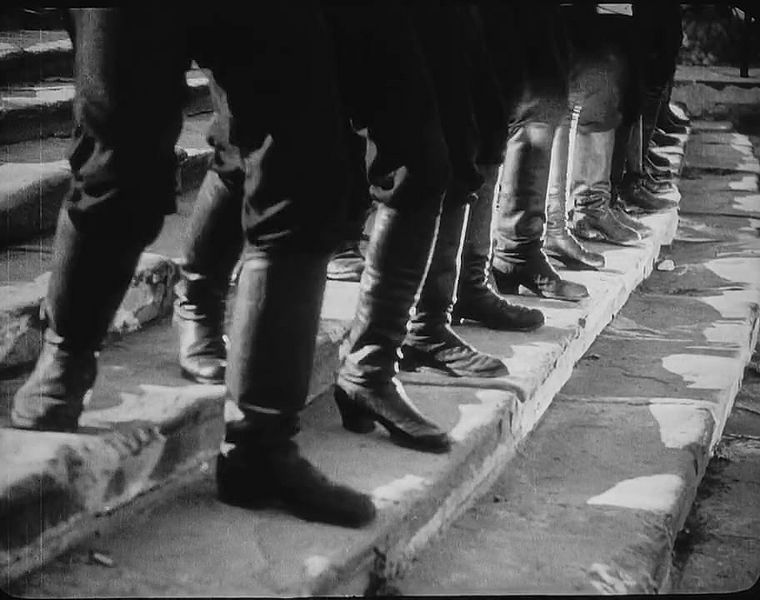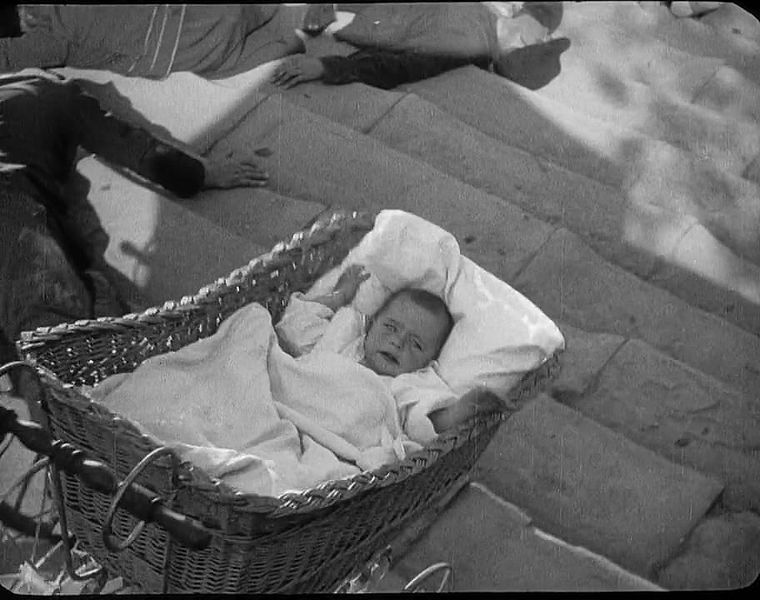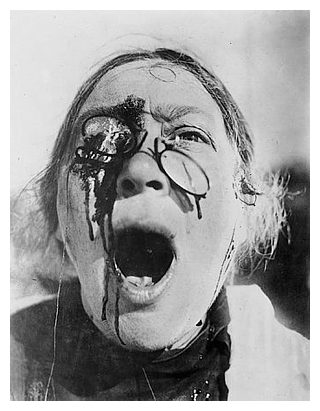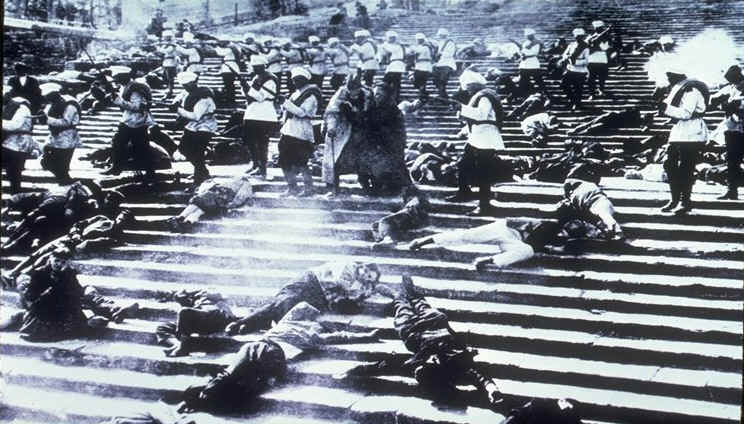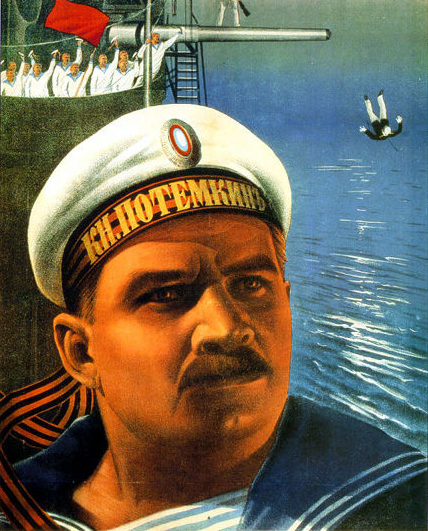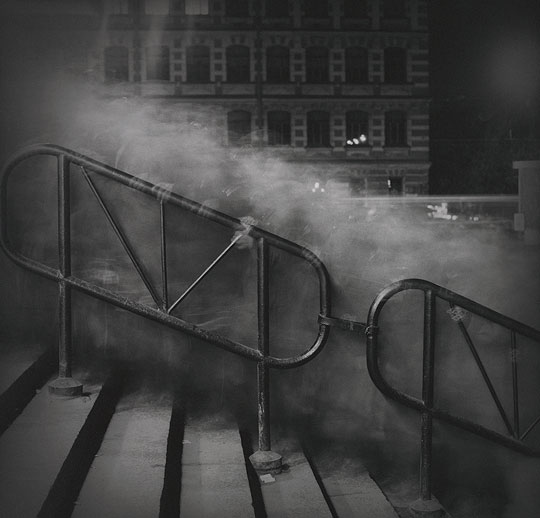<Back to Index>
- Sergei Eisenstein's The Battleship Potemkin, 1925
PAGE SPONSOR
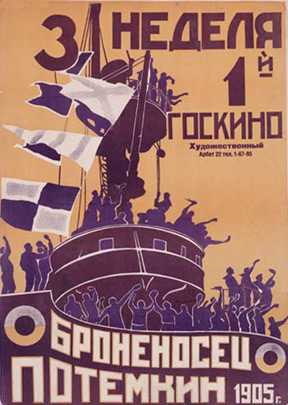
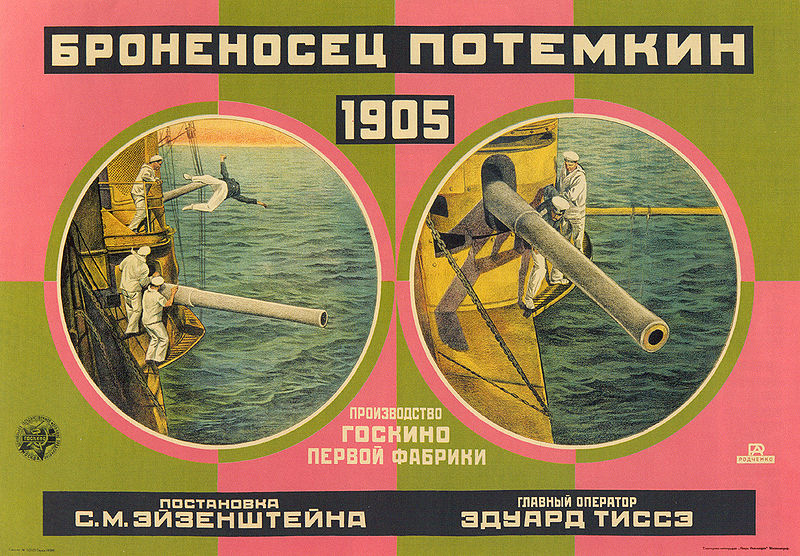
The Battleship Potemkin (Russian: Броненосец «Потёмкин»), is a 1925 silent film directed by Sergei Eisenstein and produced by Mosfilm. It presents a dramatized version of the mutiny, that occurred in 1905, when the crew of the Russian battleship Potemkin rebelled against their officers of the Tsarist regime.
The Battleship Potemkin has been called one of the most influential propaganda films of all time, and was named the greatest film of all time at the Brussels World's Fair in 1958. The film is in the public domain in some parts of the world. The film is composed of five episodes: Eisenstein wrote the film as a revolutionary propaganda film, but also used it to test his theories of "montage". The revolutionary Soviet filmmakers of the Kuleshov school of filmmaking were experimenting with the effect of film editing on audiences, and Eisenstein attempted to edit the film in such a way as to produce the greatest emotional response, so that the viewer would feel sympathy for the rebellious sailors of the Battleship Potemkin and hatred for their cruel overlords. In the manner of most propaganda, the characterization is simple, so that the audience could clearly see with whom they should sympathize. Eisenstein's experiment was a mixed success; he "was disappointed when Potemkin failed to attract masses of viewers", but
the film was also released in a number of international venues, where
audiences responded more positively. In both the Soviet Union and
overseas, the film shocked audiences, but not so much for its political
statements as for its use of violence, which was considered graphic by
the standards of the time. The film's potential to influence political thought through emotional response was noted by Nazi propaganda minister Joseph Goebbels, who called Potemkin "a marvelous film without equal in the cinema ... anyone who had no firm political conviction could become a Bolshevik after seeing the film," The film was not banned in Nazi Germany, although Himmler issued a directive prohibiting SS members from attending screenings, as he deemed the movie inappropriate for the troops.
The most celebrated scene in the film is the massacre of civilians on the Odessa Steps (also known as the Primorsky or Potemkin Stairs). In this scene, the Tsar's
soldiers in their white summer tunics march down a seemingly endless
flight of steps in a rhythmic, machine like fashion, firing volleys into
a crowd. A separate detachment of mounted Cossacks charges the crowd at the bottom of the stairs. The victims include an older woman wearing Pince - nez,
a young boy with his mother, a student in uniform and a teenage
schoolgirl. A mother pushing an infant in a baby carriage falls to the
ground dying and the carriage rolls down the steps amidst the fleeing
crowd.
The
massacre on the steps, which never took place, was presumably inserted
by Eisenstein for dramatic effect and to demonise the Imperial regime. It is, however, based on the fact that there were widespread demonstrations in the area, sparked off by the arrival of the Potemkin in Odessa Harbour, and both The Times of
London and the resident British Consul reported that troops fired on
the crowds with accompanying loss of life (the actual number of
casualties is unrecorded). Roger Ebert writes,
"That there was, in fact, no czarist massacre on the Odessa Steps
scarcely diminishes the power of the scene ... It is ironic that
[Eisenstein] did it so well that today, the bloodshed on the Odessa
steps is often referred to as if it really happened." The
scene is perhaps the best example of Eisenstein's theory on montage,
and many films pay homage to the scene, including Terry Gilliam's Brazil, Francis Ford Coppola's The Godfather, Brian De Palma's The Untouchables, Tibor Takacs' Deathline, Laurel and Hardy's The Music Box, George Lucas's Star Wars Episode III: Revenge of the Sith, Chandrashekhar Narvekar's Hindi film Tezaab, Shukō Murase's anime Ergo Proxy and Peter Sellers' The Magic Christian. Several films spoof it, including Woody Allen's Bananas and Love and Death, "Australia", Zucker, Abrahams, and Zucker's Naked Gun 33⅓: The Final Insult (though actually a parody of The Untouchables), Soviet - Polish comedy Deja Vu, Jacob Tierney's The Trotsky and the Italian comedy Il secondo tragico Fantozzi. The Irish born painter Francis Bacon (1909 – 1992)
was profoundly influenced by Eisenstein's images, particularly the
Odessa Steps shot of the schoolmistress's broken glasses and open
mouthed scream. The open mouth image appeared first in his Abstraction from the Human Form, in Fragment of a Crucifixion, and other works including his famous Head series. The Russian born photographer and artist Alexey Titarenko paid
tribute to the Odessa Steps shot in his series "City Of Shadows"
(1991 - 1993) by using crowd of desparate people on the stairs near subway
station in Saint Petersburg to demonize Soviet regime and as a symbol of human tragedy. After its premiere in the Soviet Union, Potemkin was shown in the United States.
It was shown in an edited form in Germany, with some scenes of extreme
violence edited out by its German distributors. A written introduction
by Leon Trotsky was cut from Soviet prints after he ran afoul of Joseph Stalin. The film was banned in West Germany, Britain (until 1954 and X-rated until
1978), France, and other countries for its revolutionary zeal. It was
even banned in the Soviet Union for a short period when the Comintern, under Stalin's Socialism in One Country policy, ceased promoting world revolution. Today,
the film is widely available in various DVD editions. However, in 2004,
a three year restoration of the film was completed. Many excised scenes
of violence were restored, as well as the original written introduction
by Trotsky. The previous titles, which had toned down the mutinous
sailors' revolutionary rhetoric, were corrected so that they would now
be an accurate translation of the original Russian titles in the film. To
retain its relevance as a propaganda film for each new generation,
Eisenstein hoped the score would be rewritten every 20 years. The original score was composed by Edmund Meisel.
A salon orchestra performed the Berlin premiere in 1926. The
instruments were flute / piccolo, trumpet, trombone, harmonium, percussion
and strings without viola. Meisel wrote the score in twelve days
because of the late approval of film censors. As time was so short
Meisel repeated sections of the score. Composer / conductor Mark - Andreas
Schlingensiepen has reorchestrated the original piano score to fit the
version of the film available today. Nikolai Kryukov composed a new score in 1950 for the 25th anniversary. In 1986 Eric Allaman wrote an electronic score for a showing that took place at the 1986 Berlin Film Festival.
The music was commissioned by the organizers who wanted to commemorate
the 60th anniversary of the picture's German premiere. The score was
played only at this premiere and has not been released on CD or DVD.
Contemporary reviews were largely positive apart from negative comment
because the music was electronic. Allaman also wrote an opera about
Battleship Potemkin, which is musically separate from the film score. In its commercial format, on DVD for example, the film is usually accompanied by classical music added for the 50th anniversary edition re-released in 1975. Dmitri Shostakovich and Nikolai Kryukov are two composers whose works have been used. In 2007 Del Rey & The Sun Kings also recorded this soundtrack. It is commercially available on CD and DVD. In an attempt to make the film relevant to the 21st century, Neil Tennant and Chris Lowe (of the Pet Shop Boys) composed a soundtrack in 2004 with the Dresden Symphonic Orchestra. Their soundtrack, released in 2005 as Battleship Potemkin premiered in September 2004 at an open air concert in Trafalgar Square, London. There were four further live performances of the work with the Dresdner Sinfoniker in Germany in September 2005 and one at the Swan Hunter ship yard in Newcastle upon Tyne in 2006. The avant garde jazz ensemble Club Foot Orchestra has also re-scored the film, and performed live accompaning the film. For the 2005 restoration of the film, under the direction of Enno Patalas in collaboration with Anna Bohn, released on DVD and Blu-ray, the Deutsche Kinemathek -
Museum fur Film und Fernsehen, commissioned a re-recording of the
original Edmund Meisel score, performed by the Babelsberg Orchestra,
conducted by Helmut Imig. In
2011 the most recent restoration was completed with an entirely new
soundtrack by members of the Apskaft group. Contributing members were:
AER20-200, awaycaboose, Ditzky, Drn Drn, Foucault V, fydhws, Hox Vox,
Lurholm, mexicanvader, Quendus, Res Band, -Soundso- and speculativism.
The entire film was digitally restored to a sharper image by Gianluca
Missero (who records under the name Hox Vox). The new version is
available at the Internet Archive. Since its release, The Battleship Potemkin has often been renowned as one of the finest propaganda films ever made and considered amongst the greatest films of all time. The film was named the greatest film of all time at the Brussels World's Fair in 1958. Similarly, in 1952, Sight and Sound magazine cited The Battleship Potemkin as the fourth greatest film of all time and has been voted within the top ten in every poll ever since. In 2007, a two disc, restored version of the film was released on DVD. Time magazine's Richard Corliss named it one of the Top 10 DVDs of the year, ranking it at #5. Ranked #3 in Empire magazines "The 100 Best Films Of World Cinema" in 2010. In April 2011, Battleship Potemkin was re-released in UK cinemas, distributed by the British Film Institute. On its re-release, Total Film magazine gave the film a five star review, stating: "... nearly 90 years on,
Eisenstein’s masterpiece is still guaranteed to get the pulse racing."
